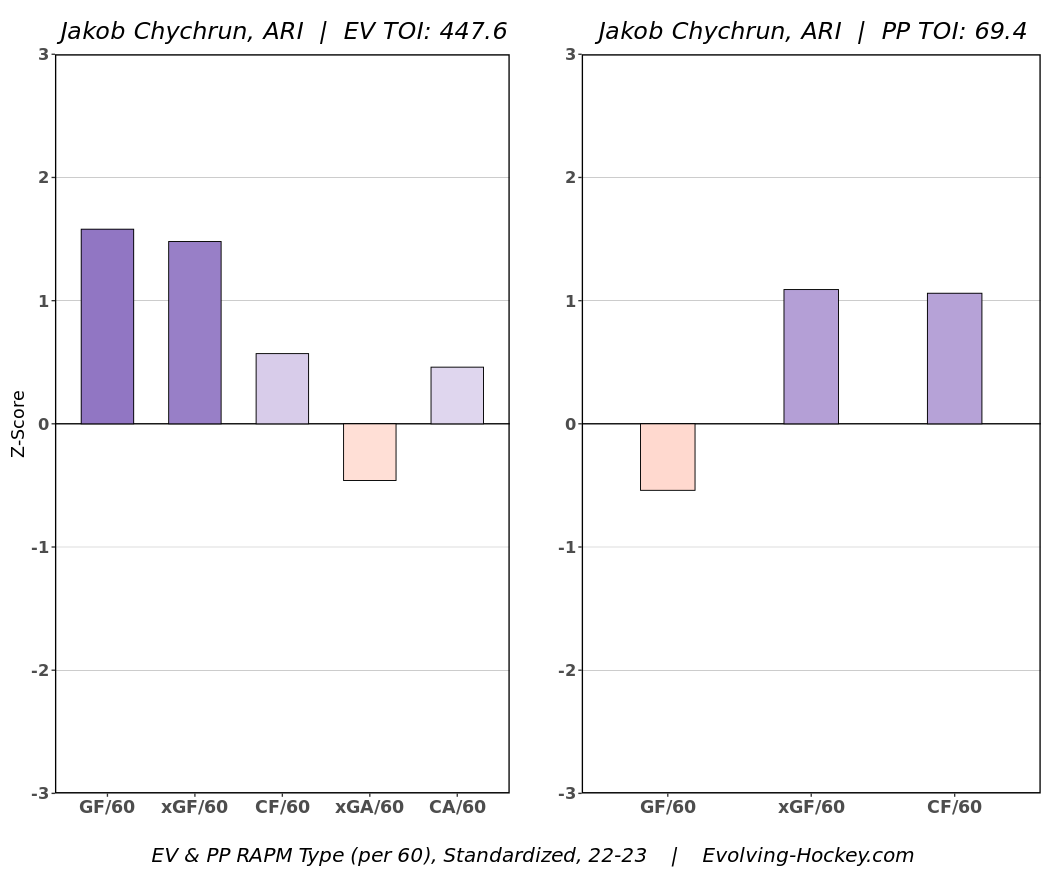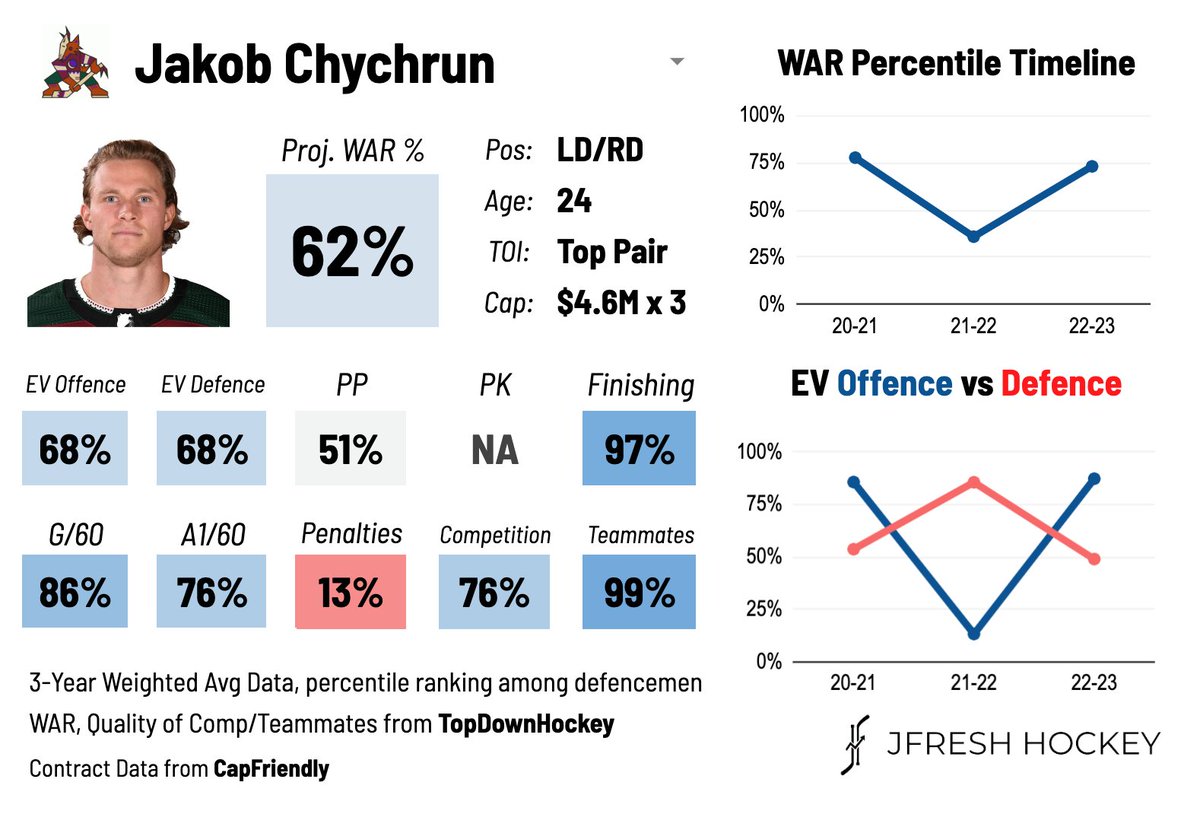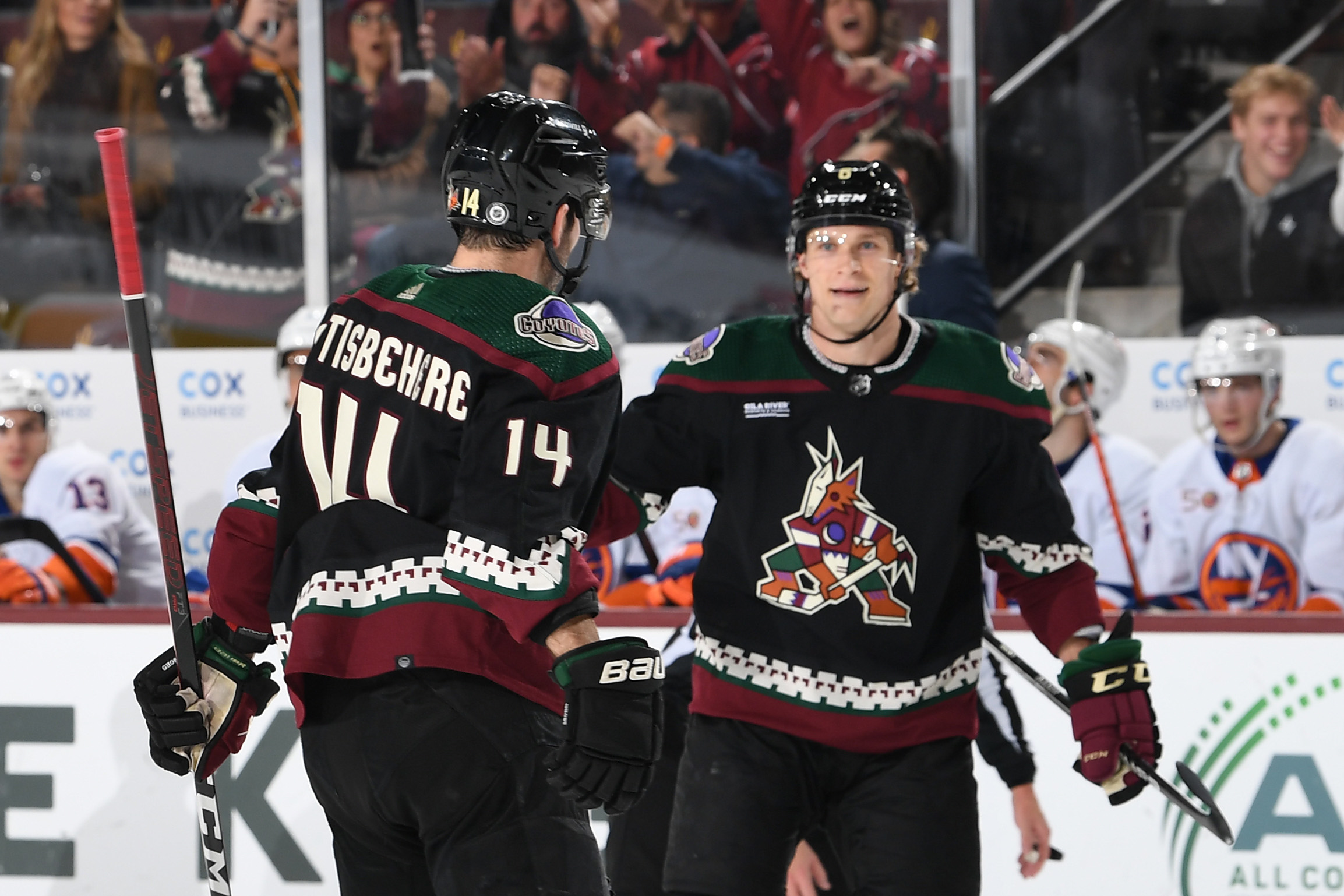© 2025 ALLCITY Network Inc.
All rights reserved.

Jakob Chychrun changed his sticks for the Coyotes’ last game against the San José Sharks. He wasn’t happy with the accuracy and velocity of his shots.
“I’ve had so many looks that I usually capitalize on that I haven’t been this year, which has been a bit frustrating,” Chychrun said of his switch to the CCM Pro stock Jetspeed. “I feel like with the looks I’ve had this year I could have 10-plus goals already.”
It’s a scary thought given what Chychrun has produced since returning to the lineup on Nov. 21 against the Nashville Predators. In 24 games, he had five goals and 20 points. He was 11th among NHL defensemen in points per game at .83, and he was third among Coyotes in shots on goal (76) despite missing the first 16 games of the season.
A deeper look reveals that Chychrun’s advanced stats have risen back to his expected levels after what was arguably the worst season of his career in 2021-22. His expected goals per 60 minutes is the highest on the team, his possession stats are also among the top two or three players on the team, and he is driving offense. 
“I have to hand it to Chych,” GM Bill Armstrong said. “There’s been a lot of nights where he’s been our best player.” Here’s a deeper look at his advanced stats. 
“This season’s numbers so far are back where they were in ’20-’21,” said Jack Fraser, known as JFresh online, who provided this player card last weekend. That’s an encouraging sign for Chychrun because the 2020-21 season was when he led all NHL defensemen in goals with 18 (41 points) in just 56 games and finished 10th in Norris Trophy voting for the NHL’s best defenseman.
“I’ve just been playing and having fun and that’s when I play my best so things have been good,” he said.
The fact that Chychrun is enjoying himself again is no doubt a factor in his return to this level of play, but there are other factors as well. Here’s a look at three of those with insight from PHNX Sports’ Steve Peters, who was a Coyotes video and assistant coach for 23 seasons.

Ghost protocol
Since returning to the lineup, Chychrun has mostly been paired with Shayne Gostisbehere, and he has been on the ice a lot when the Clayton Keller-Nick Schmaltz forward pairing is also on the ice. That offers plenty of opportunities to play offense because all three of those players are offensive minded.
Keller leads the team with 37 points. Gostisbehere is second with 28 and Schmaltz is sixth with 19 despite also missing 16 games. Chychrun is also a major part of the team’s power-play unit again after taking a backseat last season while Phil Kessel was here. Finally, 60.3 percent of his zone starts have been in the offensive zone, per hockeyreference.com, as opposed to a six-year low of 45.4 percent last season.
“Playing with Ghost is obviously a big difference between this year and last year,” Chychrun said. “It’s just a lot easier to generate when you play with a guy that thinks the game the same way and wants to get the puck in the O-zone and play with it.
“We’re trying to generate [offense] and we’re kind of relied on heavily for that. That’s probably the biggest difference from this year to last year is just the way I’m being utilized.”
Since Nov. 21 (Chychrun’s return to the lineup), the Winnipeg Jets’ defense pair of Josh Morrissey and Dylan DeMelo is the only pair in the NHL that has produced more points (39) than the Chychrun-Gostisbehere duo (38).
“They do understand each other, they read off each other and they respect each other so they want to be good for each other,” coach André Tourigny said. “They trust each other so that’s a big part of the game. When you understand how your partner thinks, I think it simplifies everything, makes it predictable and takes the puzzle away from your game.”
Both players have been the subject of rampant trade speculation. Gostisbehere is playing on an expiring contract and Chychrun has told the Coyotes that he’d like to be traded. Playing together has afforded pro scouts an opportunity to assess what either one might bring to a playoff team or Stanley Cup contender, and it has afforded each player an opportunity to showcase his skills.
Chychrun on defense
In his first season as the Coyotes’ coach, Tourigny had Chychrun in more of a shutdown role. The results were not good, as Peters illustrates in these slides. Chychrun’s technique needed work.
Tourigny also believes that Chychrun is more engaged this season, whereas last season he struggled to adapt to and accept a different role that he didn’t feel was geared toward his strengths. You often hear the phrase, defense leads to offense. In Chychrun’s case, the opportunity to play more on offense may be leading to better defense.
“He’s on top of the puck carrier. He’s pressing the puck carrier. Last year, he was containing every time. He didn’t use his strength and he is a strong man, a big man in top shape,” Tourigny said. “Last year was containing and a lot of using his stick. He was not as hard-nosed on the puck carrier and this year is way different.”
These slides from Peters that compare Chychrun’s 2020-21 season to his 2022-23 season illustrate what Tourigny means.



 It’s also worth underscoring the strength aspect that Tourigny mentioned. Chychrun discussed his raw-meat diet in an interview that I conducted with him last month, but last season on break-up day, he already looked noticeably more muscular. In the time that he missed with an injury last season, he said he spent a lot of time working on his body, adding lean muscle mass.
It’s also worth underscoring the strength aspect that Tourigny mentioned. Chychrun discussed his raw-meat diet in an interview that I conducted with him last month, but last season on break-up day, he already looked noticeably more muscular. In the time that he missed with an injury last season, he said he spent a lot of time working on his body, adding lean muscle mass.
It’s probably not a coincidence that Chychrun has been more physical this season. He is averaging 1.46 hits per game as opposed to 1.09 last season and 1.04 the season before. As Peters noted, he is doing a better job of positioning himself on wall battles and off the rush to be more physical.
“I’ve always been so big on the off-ice stuff and doing everything you can to be in a position at the start of the year where you’re strong, you’re fast, your endurance is there and your body is in a good place,” he said. “Over the years, I’ve just learned so much with the injuries and just figuring out what really works for me and I think I’ve really settled into something that I think is going to work for me long term and I’m just really excited about it.
“I think a big thing, too, is you just have more energy when you’re not carrying as much weight. You have more energy later on in your shift. I remember hearing [Brad] Marchand talk about that when he was coming back from his hip surgeries this summer. He said, early on, he was frustrated because he just felt his endurance wasn’t there at the end of the shifts. He was losing battles he doesn’t normally lose and I think that’s something I’ve found a big difference with is my endurance is a lot better where I can be out there 30 seconds into my shift and I’m still able to have legs to get up the ice or get back or close on a guy. That’s been a big thing I’ve noticed this year compared to last year. It just feels good to feel a bit lighter on your feet.”
Chychrun on offense
Offense is where Chychrun’s bread is buttered. He is a powerful skater who can join the rush as a fourth attacker and find space to unleash a bone-breaking slapshot or a tool that he has been using with more frequency in tighter spaces this season, a hard, accurate wrist shot.
Chychrun hasn’t been known as a guy who carries the puck up ice or makes jaw-dropping passes like his defensive partner or the Sharks’ Erik Karlsson. But he has shown that ability in his arsenal this season as he did on this precise stretch pass to Lawson Crouse that eventually sprung Matias Maccelli for a goal against Montréal on Dec. 19.
“I think he is moving his feet and he’s way more active with and without the puck so he is an option,” Tourigny said. “You see him everywhere. You see him around the net. You see him at the blue line. You see him move east-west. It’s just a matter for him to be engaged. Sometimes he gets kind of on pause and stays in the middle of the ice. He wants to play defensively and he waits for the plays to come to him all the time. He’s the kind of guy who needs to push the pace, push his skating offensively.”
As Peters illustrates in these slides, it’s also a matter of Chychrun getting himself in the right positions on the ice to receive a pass and shoot, and getting himself in the right shooting form and motion. 



 It is unclear whether Armstrong will get his asking price for Chychrun at the trade deadline, the draft, or at any point while he is still under contract through the 2024-25 season. However this once unthinkable trade scenario plays out, Chychrun is doing his part to raise his stock back to the level where it was two seasons ago.
It is unclear whether Armstrong will get his asking price for Chychrun at the trade deadline, the draft, or at any point while he is still under contract through the 2024-25 season. However this once unthinkable trade scenario plays out, Chychrun is doing his part to raise his stock back to the level where it was two seasons ago.
“He’s been elite,” Tourigny said. “He is playing to his potential.”
Top photo of Jakob Chychrun via Getty Images
Follow Craig Morgan on Twitter
Comments
Share your thoughts
Join the conversation



